Addressing Mental Health Disparities in Indigenous Australians
VerifiedAdded on 2023/03/31
|8
|1683
|285
Essay
AI Summary
This essay explores the challenges mental health workers face when working with Indigenous Australians, highlighting the disparities in mental health outcomes and the critical need for culturally appropriate care. It addresses the historical context of colonization, poverty, and marginalization, which contribute to higher rates of mental illness, suicide, and substance abuse within the Indigenous population. The essay emphasizes the importance of cultural safety, relationship building, and organizational support for mental health workers to effectively engage with Indigenous communities. It also suggests strategies such as cultural awareness training, recruitment of Aboriginal health professionals, and creating welcoming healthcare environments to improve mental health outcomes and ensure equitable access to services for Indigenous Australians.
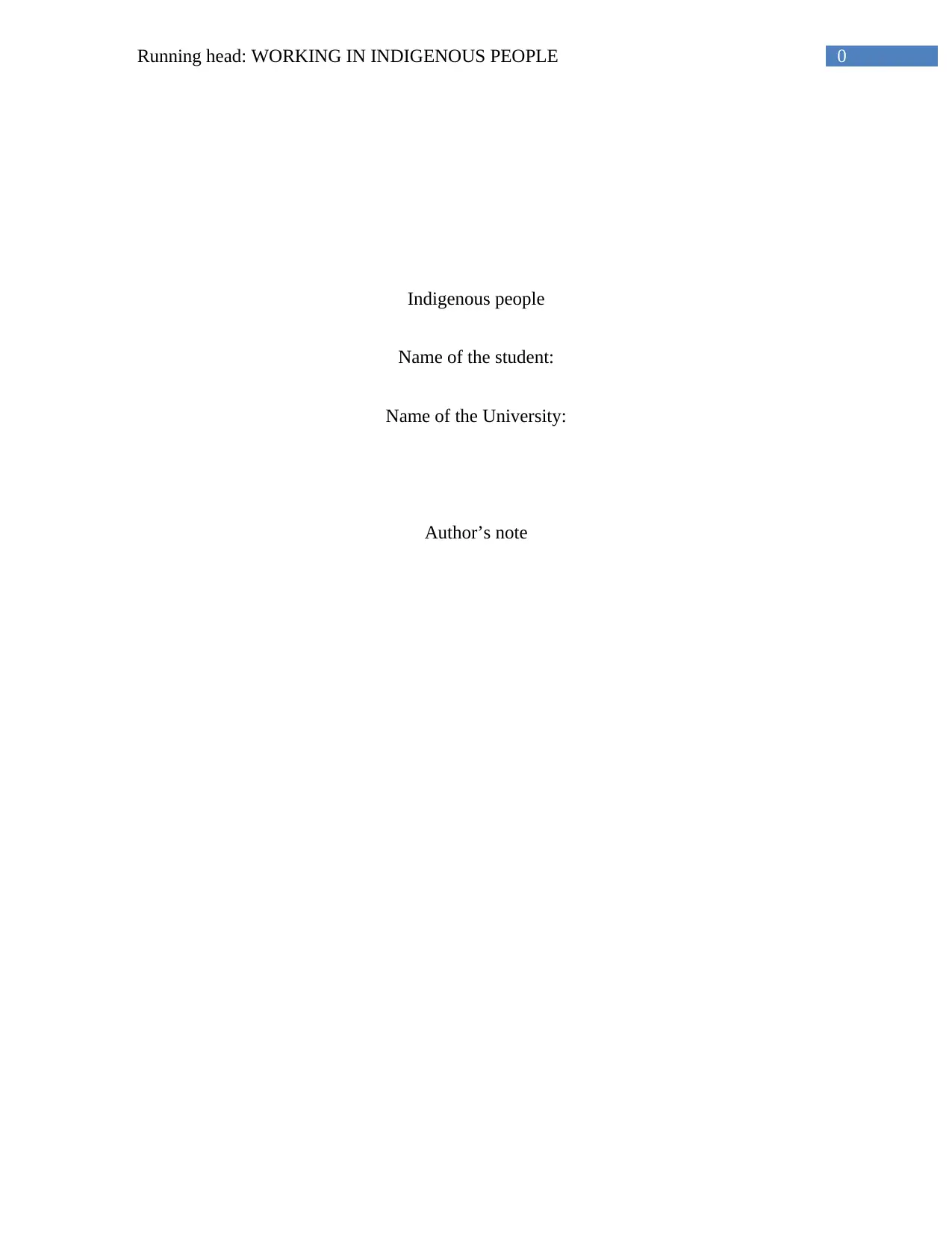
0Running head: WORKING IN INDIGENOUS PEOPLE
Indigenous people
Name of the student:
Name of the University:
Author’s note
Indigenous people
Name of the student:
Name of the University:
Author’s note
Paraphrase This Document
Need a fresh take? Get an instant paraphrase of this document with our AI Paraphraser
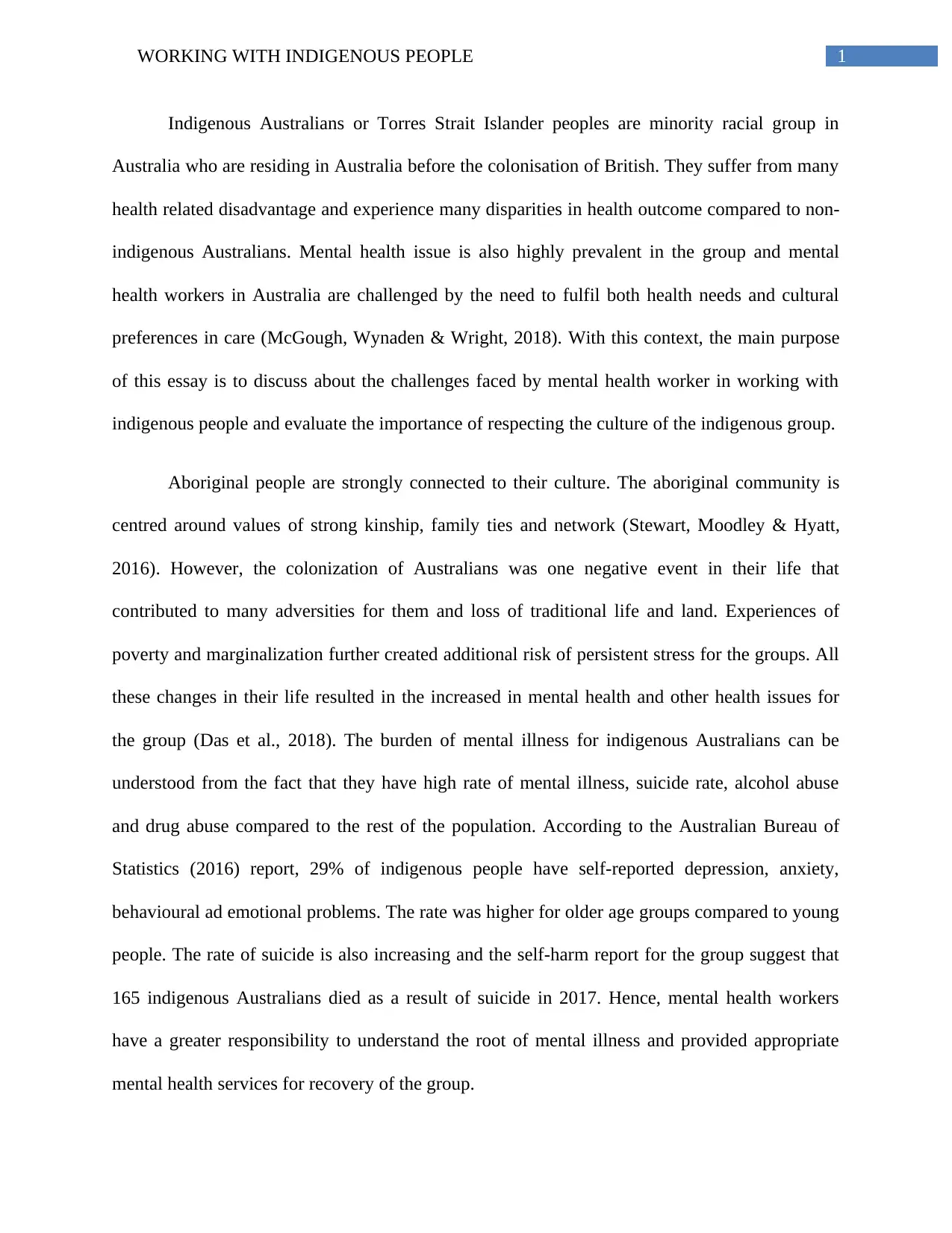
1WORKING WITH INDIGENOUS PEOPLE
Indigenous Australians or Torres Strait Islander peoples are minority racial group in
Australia who are residing in Australia before the colonisation of British. They suffer from many
health related disadvantage and experience many disparities in health outcome compared to non-
indigenous Australians. Mental health issue is also highly prevalent in the group and mental
health workers in Australia are challenged by the need to fulfil both health needs and cultural
preferences in care (McGough, Wynaden & Wright, 2018). With this context, the main purpose
of this essay is to discuss about the challenges faced by mental health worker in working with
indigenous people and evaluate the importance of respecting the culture of the indigenous group.
Aboriginal people are strongly connected to their culture. The aboriginal community is
centred around values of strong kinship, family ties and network (Stewart, Moodley & Hyatt,
2016). However, the colonization of Australians was one negative event in their life that
contributed to many adversities for them and loss of traditional life and land. Experiences of
poverty and marginalization further created additional risk of persistent stress for the groups. All
these changes in their life resulted in the increased in mental health and other health issues for
the group (Das et al., 2018). The burden of mental illness for indigenous Australians can be
understood from the fact that they have high rate of mental illness, suicide rate, alcohol abuse
and drug abuse compared to the rest of the population. According to the Australian Bureau of
Statistics (2016) report, 29% of indigenous people have self-reported depression, anxiety,
behavioural ad emotional problems. The rate was higher for older age groups compared to young
people. The rate of suicide is also increasing and the self-harm report for the group suggest that
165 indigenous Australians died as a result of suicide in 2017. Hence, mental health workers
have a greater responsibility to understand the root of mental illness and provided appropriate
mental health services for recovery of the group.
Indigenous Australians or Torres Strait Islander peoples are minority racial group in
Australia who are residing in Australia before the colonisation of British. They suffer from many
health related disadvantage and experience many disparities in health outcome compared to non-
indigenous Australians. Mental health issue is also highly prevalent in the group and mental
health workers in Australia are challenged by the need to fulfil both health needs and cultural
preferences in care (McGough, Wynaden & Wright, 2018). With this context, the main purpose
of this essay is to discuss about the challenges faced by mental health worker in working with
indigenous people and evaluate the importance of respecting the culture of the indigenous group.
Aboriginal people are strongly connected to their culture. The aboriginal community is
centred around values of strong kinship, family ties and network (Stewart, Moodley & Hyatt,
2016). However, the colonization of Australians was one negative event in their life that
contributed to many adversities for them and loss of traditional life and land. Experiences of
poverty and marginalization further created additional risk of persistent stress for the groups. All
these changes in their life resulted in the increased in mental health and other health issues for
the group (Das et al., 2018). The burden of mental illness for indigenous Australians can be
understood from the fact that they have high rate of mental illness, suicide rate, alcohol abuse
and drug abuse compared to the rest of the population. According to the Australian Bureau of
Statistics (2016) report, 29% of indigenous people have self-reported depression, anxiety,
behavioural ad emotional problems. The rate was higher for older age groups compared to young
people. The rate of suicide is also increasing and the self-harm report for the group suggest that
165 indigenous Australians died as a result of suicide in 2017. Hence, mental health workers
have a greater responsibility to understand the root of mental illness and provided appropriate
mental health services for recovery of the group.
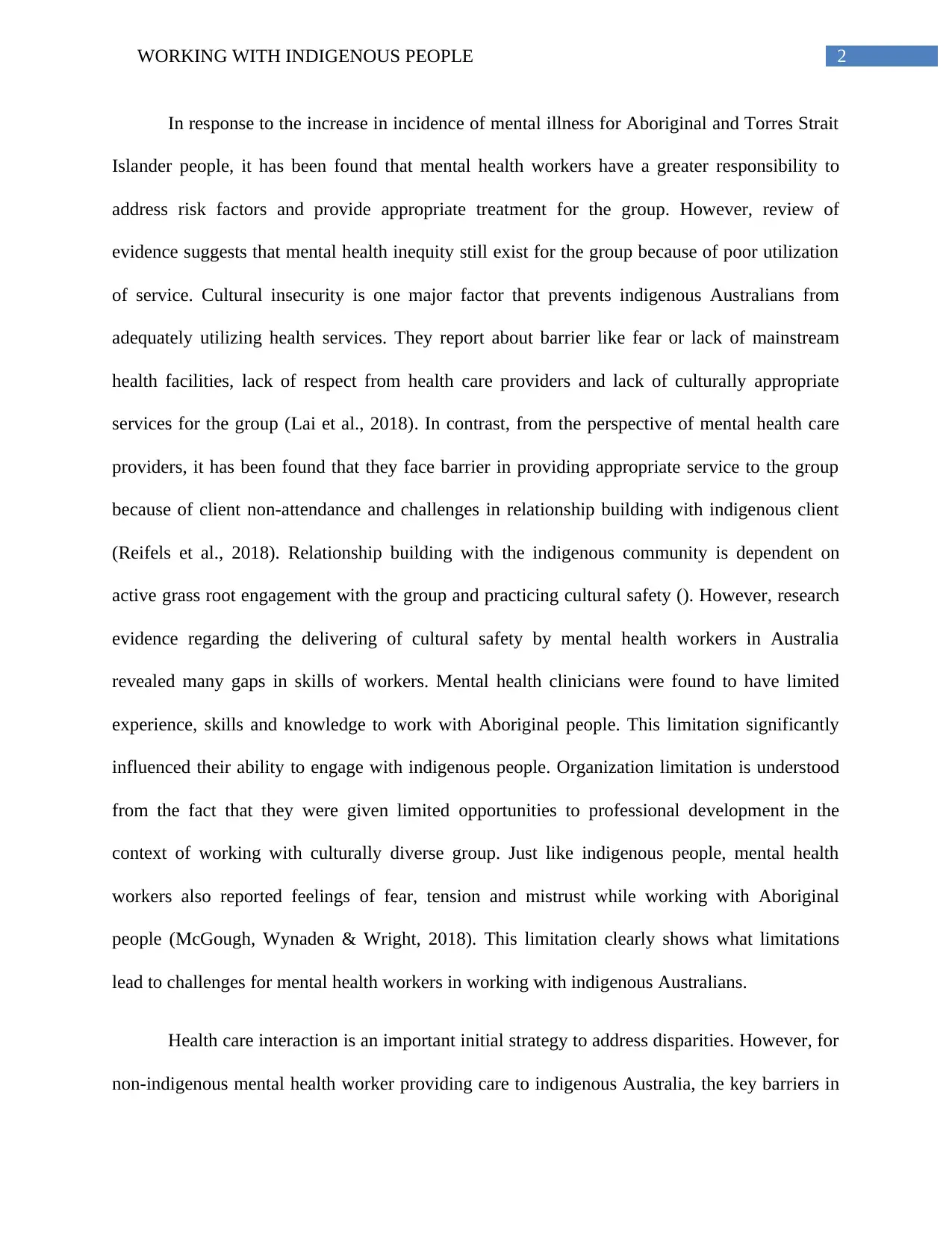
2WORKING WITH INDIGENOUS PEOPLE
In response to the increase in incidence of mental illness for Aboriginal and Torres Strait
Islander people, it has been found that mental health workers have a greater responsibility to
address risk factors and provide appropriate treatment for the group. However, review of
evidence suggests that mental health inequity still exist for the group because of poor utilization
of service. Cultural insecurity is one major factor that prevents indigenous Australians from
adequately utilizing health services. They report about barrier like fear or lack of mainstream
health facilities, lack of respect from health care providers and lack of culturally appropriate
services for the group (Lai et al., 2018). In contrast, from the perspective of mental health care
providers, it has been found that they face barrier in providing appropriate service to the group
because of client non-attendance and challenges in relationship building with indigenous client
(Reifels et al., 2018). Relationship building with the indigenous community is dependent on
active grass root engagement with the group and practicing cultural safety (). However, research
evidence regarding the delivering of cultural safety by mental health workers in Australia
revealed many gaps in skills of workers. Mental health clinicians were found to have limited
experience, skills and knowledge to work with Aboriginal people. This limitation significantly
influenced their ability to engage with indigenous people. Organization limitation is understood
from the fact that they were given limited opportunities to professional development in the
context of working with culturally diverse group. Just like indigenous people, mental health
workers also reported feelings of fear, tension and mistrust while working with Aboriginal
people (McGough, Wynaden & Wright, 2018). This limitation clearly shows what limitations
lead to challenges for mental health workers in working with indigenous Australians.
Health care interaction is an important initial strategy to address disparities. However, for
non-indigenous mental health worker providing care to indigenous Australia, the key barriers in
In response to the increase in incidence of mental illness for Aboriginal and Torres Strait
Islander people, it has been found that mental health workers have a greater responsibility to
address risk factors and provide appropriate treatment for the group. However, review of
evidence suggests that mental health inequity still exist for the group because of poor utilization
of service. Cultural insecurity is one major factor that prevents indigenous Australians from
adequately utilizing health services. They report about barrier like fear or lack of mainstream
health facilities, lack of respect from health care providers and lack of culturally appropriate
services for the group (Lai et al., 2018). In contrast, from the perspective of mental health care
providers, it has been found that they face barrier in providing appropriate service to the group
because of client non-attendance and challenges in relationship building with indigenous client
(Reifels et al., 2018). Relationship building with the indigenous community is dependent on
active grass root engagement with the group and practicing cultural safety (). However, research
evidence regarding the delivering of cultural safety by mental health workers in Australia
revealed many gaps in skills of workers. Mental health clinicians were found to have limited
experience, skills and knowledge to work with Aboriginal people. This limitation significantly
influenced their ability to engage with indigenous people. Organization limitation is understood
from the fact that they were given limited opportunities to professional development in the
context of working with culturally diverse group. Just like indigenous people, mental health
workers also reported feelings of fear, tension and mistrust while working with Aboriginal
people (McGough, Wynaden & Wright, 2018). This limitation clearly shows what limitations
lead to challenges for mental health workers in working with indigenous Australians.
Health care interaction is an important initial strategy to address disparities. However, for
non-indigenous mental health worker providing care to indigenous Australia, the key barriers in
⊘ This is a preview!⊘
Do you want full access?
Subscribe today to unlock all pages.

Trusted by 1+ million students worldwide
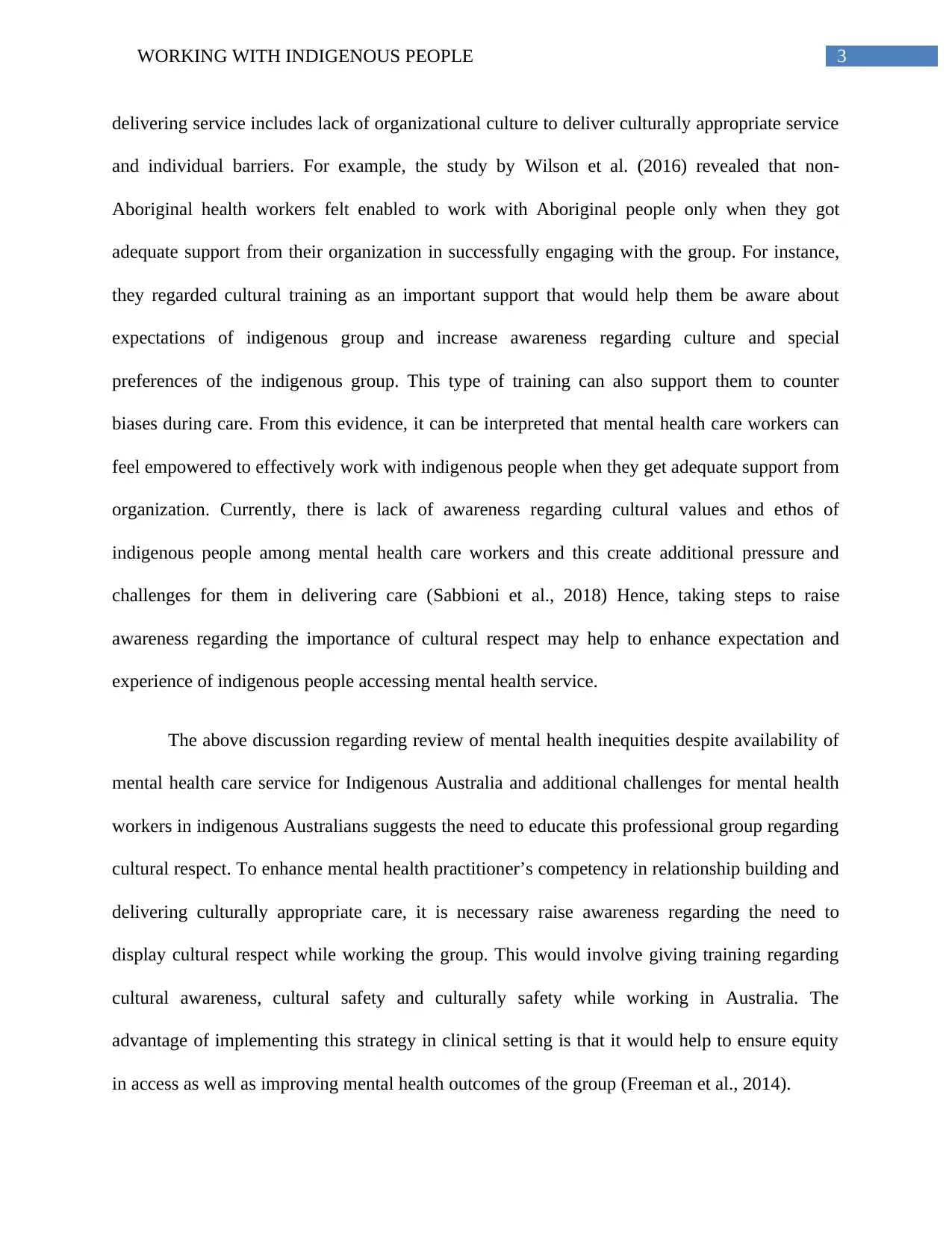
3WORKING WITH INDIGENOUS PEOPLE
delivering service includes lack of organizational culture to deliver culturally appropriate service
and individual barriers. For example, the study by Wilson et al. (2016) revealed that non-
Aboriginal health workers felt enabled to work with Aboriginal people only when they got
adequate support from their organization in successfully engaging with the group. For instance,
they regarded cultural training as an important support that would help them be aware about
expectations of indigenous group and increase awareness regarding culture and special
preferences of the indigenous group. This type of training can also support them to counter
biases during care. From this evidence, it can be interpreted that mental health care workers can
feel empowered to effectively work with indigenous people when they get adequate support from
organization. Currently, there is lack of awareness regarding cultural values and ethos of
indigenous people among mental health care workers and this create additional pressure and
challenges for them in delivering care (Sabbioni et al., 2018) Hence, taking steps to raise
awareness regarding the importance of cultural respect may help to enhance expectation and
experience of indigenous people accessing mental health service.
The above discussion regarding review of mental health inequities despite availability of
mental health care service for Indigenous Australia and additional challenges for mental health
workers in indigenous Australians suggests the need to educate this professional group regarding
cultural respect. To enhance mental health practitioner’s competency in relationship building and
delivering culturally appropriate care, it is necessary raise awareness regarding the need to
display cultural respect while working the group. This would involve giving training regarding
cultural awareness, cultural safety and culturally safety while working in Australia. The
advantage of implementing this strategy in clinical setting is that it would help to ensure equity
in access as well as improving mental health outcomes of the group (Freeman et al., 2014).
delivering service includes lack of organizational culture to deliver culturally appropriate service
and individual barriers. For example, the study by Wilson et al. (2016) revealed that non-
Aboriginal health workers felt enabled to work with Aboriginal people only when they got
adequate support from their organization in successfully engaging with the group. For instance,
they regarded cultural training as an important support that would help them be aware about
expectations of indigenous group and increase awareness regarding culture and special
preferences of the indigenous group. This type of training can also support them to counter
biases during care. From this evidence, it can be interpreted that mental health care workers can
feel empowered to effectively work with indigenous people when they get adequate support from
organization. Currently, there is lack of awareness regarding cultural values and ethos of
indigenous people among mental health care workers and this create additional pressure and
challenges for them in delivering care (Sabbioni et al., 2018) Hence, taking steps to raise
awareness regarding the importance of cultural respect may help to enhance expectation and
experience of indigenous people accessing mental health service.
The above discussion regarding review of mental health inequities despite availability of
mental health care service for Indigenous Australia and additional challenges for mental health
workers in indigenous Australians suggests the need to educate this professional group regarding
cultural respect. To enhance mental health practitioner’s competency in relationship building and
delivering culturally appropriate care, it is necessary raise awareness regarding the need to
display cultural respect while working the group. This would involve giving training regarding
cultural awareness, cultural safety and culturally safety while working in Australia. The
advantage of implementing this strategy in clinical setting is that it would help to ensure equity
in access as well as improving mental health outcomes of the group (Freeman et al., 2014).
Paraphrase This Document
Need a fresh take? Get an instant paraphrase of this document with our AI Paraphraser
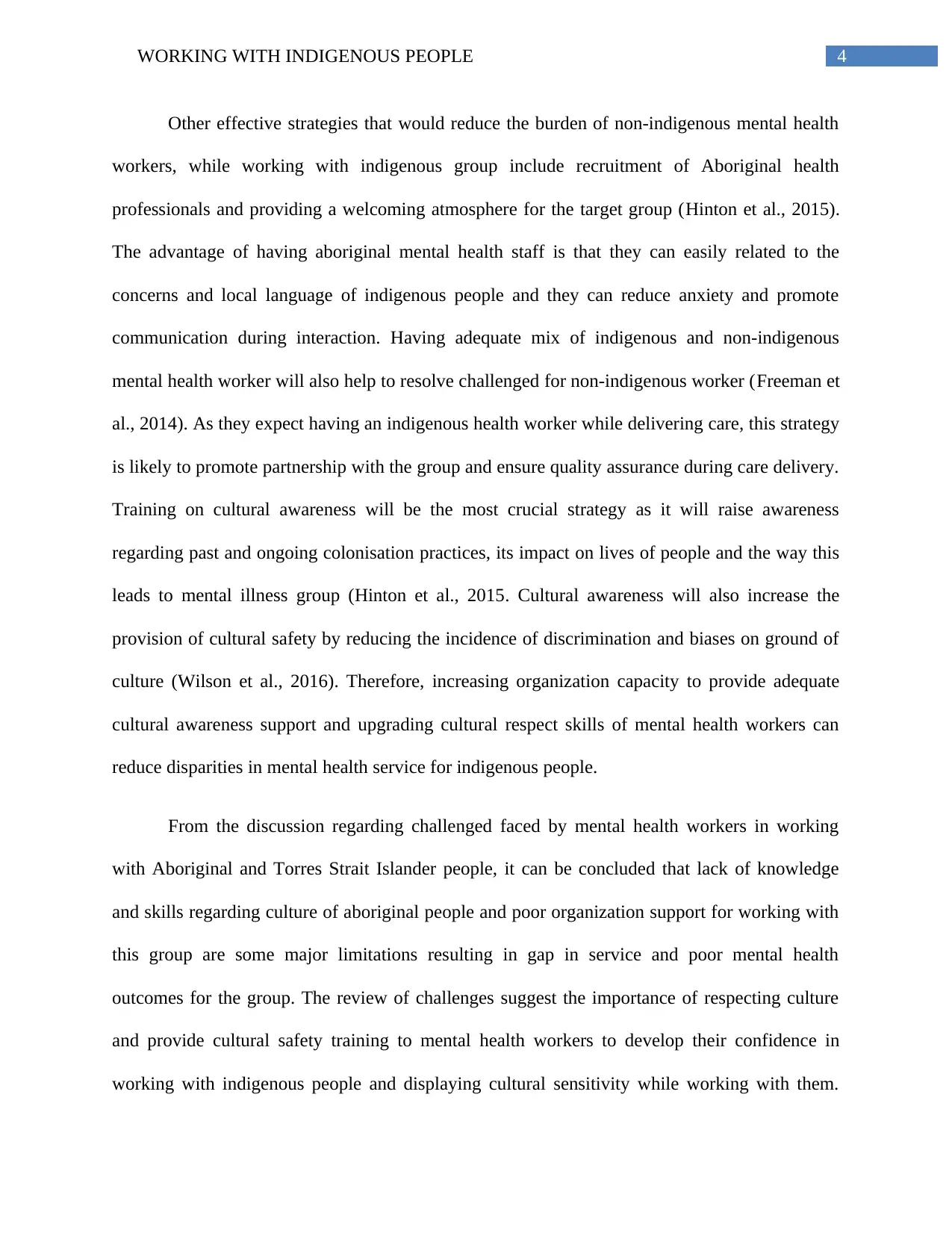
4WORKING WITH INDIGENOUS PEOPLE
Other effective strategies that would reduce the burden of non-indigenous mental health
workers, while working with indigenous group include recruitment of Aboriginal health
professionals and providing a welcoming atmosphere for the target group (Hinton et al., 2015).
The advantage of having aboriginal mental health staff is that they can easily related to the
concerns and local language of indigenous people and they can reduce anxiety and promote
communication during interaction. Having adequate mix of indigenous and non-indigenous
mental health worker will also help to resolve challenged for non-indigenous worker (Freeman et
al., 2014). As they expect having an indigenous health worker while delivering care, this strategy
is likely to promote partnership with the group and ensure quality assurance during care delivery.
Training on cultural awareness will be the most crucial strategy as it will raise awareness
regarding past and ongoing colonisation practices, its impact on lives of people and the way this
leads to mental illness group (Hinton et al., 2015. Cultural awareness will also increase the
provision of cultural safety by reducing the incidence of discrimination and biases on ground of
culture (Wilson et al., 2016). Therefore, increasing organization capacity to provide adequate
cultural awareness support and upgrading cultural respect skills of mental health workers can
reduce disparities in mental health service for indigenous people.
From the discussion regarding challenged faced by mental health workers in working
with Aboriginal and Torres Strait Islander people, it can be concluded that lack of knowledge
and skills regarding culture of aboriginal people and poor organization support for working with
this group are some major limitations resulting in gap in service and poor mental health
outcomes for the group. The review of challenges suggest the importance of respecting culture
and provide cultural safety training to mental health workers to develop their confidence in
working with indigenous people and displaying cultural sensitivity while working with them.
Other effective strategies that would reduce the burden of non-indigenous mental health
workers, while working with indigenous group include recruitment of Aboriginal health
professionals and providing a welcoming atmosphere for the target group (Hinton et al., 2015).
The advantage of having aboriginal mental health staff is that they can easily related to the
concerns and local language of indigenous people and they can reduce anxiety and promote
communication during interaction. Having adequate mix of indigenous and non-indigenous
mental health worker will also help to resolve challenged for non-indigenous worker (Freeman et
al., 2014). As they expect having an indigenous health worker while delivering care, this strategy
is likely to promote partnership with the group and ensure quality assurance during care delivery.
Training on cultural awareness will be the most crucial strategy as it will raise awareness
regarding past and ongoing colonisation practices, its impact on lives of people and the way this
leads to mental illness group (Hinton et al., 2015. Cultural awareness will also increase the
provision of cultural safety by reducing the incidence of discrimination and biases on ground of
culture (Wilson et al., 2016). Therefore, increasing organization capacity to provide adequate
cultural awareness support and upgrading cultural respect skills of mental health workers can
reduce disparities in mental health service for indigenous people.
From the discussion regarding challenged faced by mental health workers in working
with Aboriginal and Torres Strait Islander people, it can be concluded that lack of knowledge
and skills regarding culture of aboriginal people and poor organization support for working with
this group are some major limitations resulting in gap in service and poor mental health
outcomes for the group. The review of challenges suggest the importance of respecting culture
and provide cultural safety training to mental health workers to develop their confidence in
working with indigenous people and displaying cultural sensitivity while working with them.
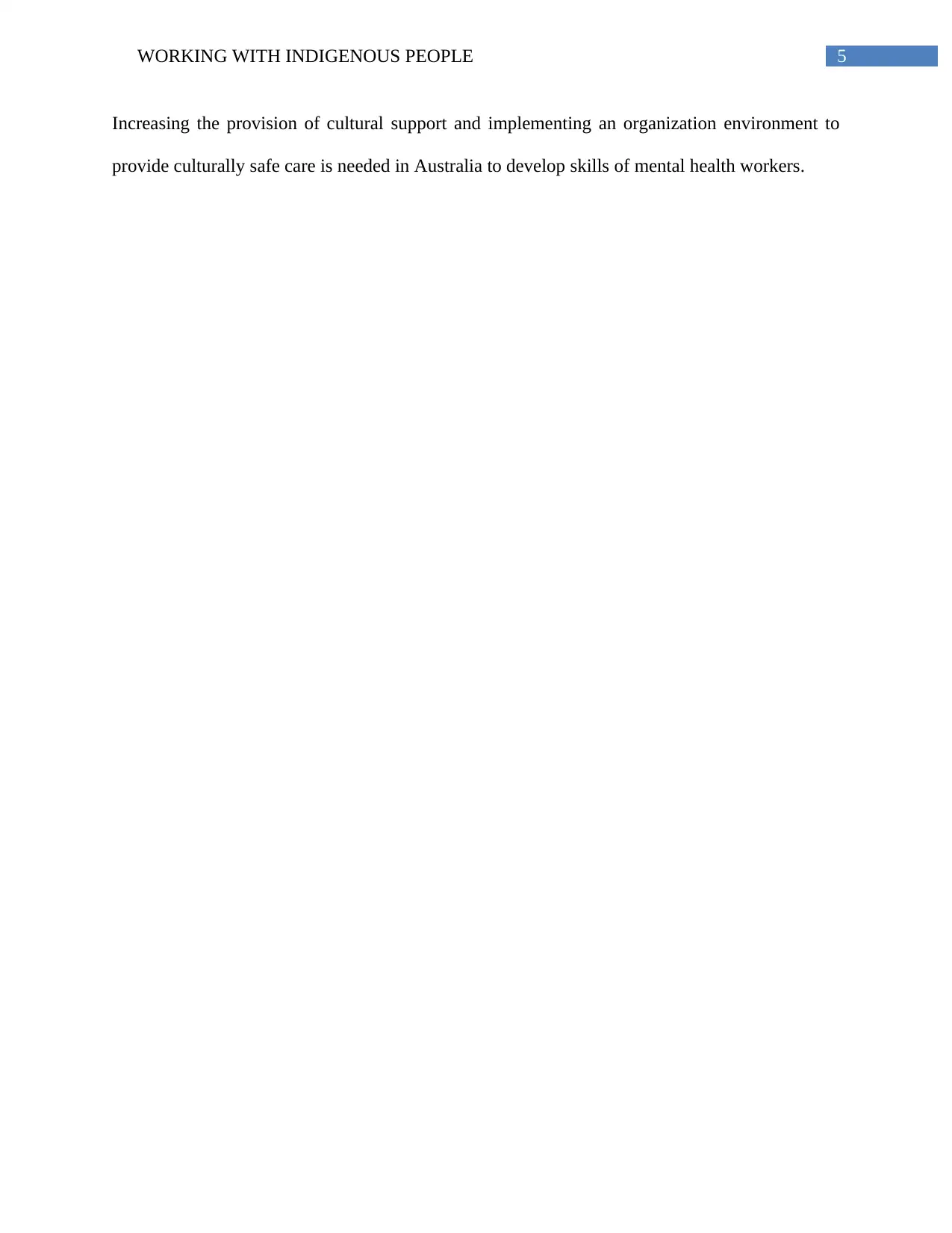
5WORKING WITH INDIGENOUS PEOPLE
Increasing the provision of cultural support and implementing an organization environment to
provide culturally safe care is needed in Australia to develop skills of mental health workers.
Increasing the provision of cultural support and implementing an organization environment to
provide culturally safe care is needed in Australia to develop skills of mental health workers.
⊘ This is a preview!⊘
Do you want full access?
Subscribe today to unlock all pages.

Trusted by 1+ million students worldwide
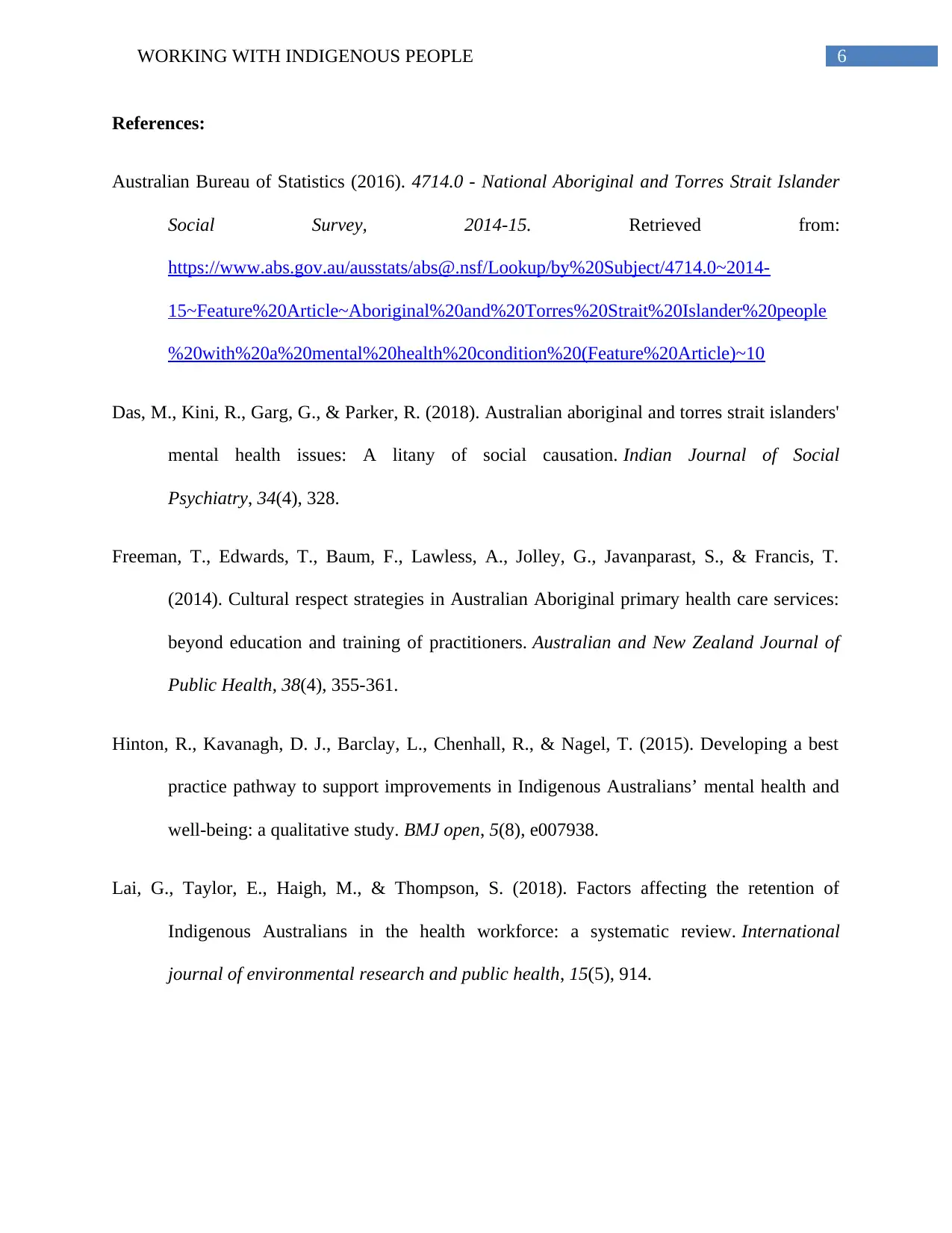
6WORKING WITH INDIGENOUS PEOPLE
References:
Australian Bureau of Statistics (2016). 4714.0 - National Aboriginal and Torres Strait Islander
Social Survey, 2014-15. Retrieved from:
https://www.abs.gov.au/ausstats/abs@.nsf/Lookup/by%20Subject/4714.0~2014-
15~Feature%20Article~Aboriginal%20and%20Torres%20Strait%20Islander%20people
%20with%20a%20mental%20health%20condition%20(Feature%20Article)~10
Das, M., Kini, R., Garg, G., & Parker, R. (2018). Australian aboriginal and torres strait islanders'
mental health issues: A litany of social causation. Indian Journal of Social
Psychiatry, 34(4), 328.
Freeman, T., Edwards, T., Baum, F., Lawless, A., Jolley, G., Javanparast, S., & Francis, T.
(2014). Cultural respect strategies in Australian Aboriginal primary health care services:
beyond education and training of practitioners. Australian and New Zealand Journal of
Public Health, 38(4), 355-361.
Hinton, R., Kavanagh, D. J., Barclay, L., Chenhall, R., & Nagel, T. (2015). Developing a best
practice pathway to support improvements in Indigenous Australians’ mental health and
well-being: a qualitative study. BMJ open, 5(8), e007938.
Lai, G., Taylor, E., Haigh, M., & Thompson, S. (2018). Factors affecting the retention of
Indigenous Australians in the health workforce: a systematic review. International
journal of environmental research and public health, 15(5), 914.
References:
Australian Bureau of Statistics (2016). 4714.0 - National Aboriginal and Torres Strait Islander
Social Survey, 2014-15. Retrieved from:
https://www.abs.gov.au/ausstats/abs@.nsf/Lookup/by%20Subject/4714.0~2014-
15~Feature%20Article~Aboriginal%20and%20Torres%20Strait%20Islander%20people
%20with%20a%20mental%20health%20condition%20(Feature%20Article)~10
Das, M., Kini, R., Garg, G., & Parker, R. (2018). Australian aboriginal and torres strait islanders'
mental health issues: A litany of social causation. Indian Journal of Social
Psychiatry, 34(4), 328.
Freeman, T., Edwards, T., Baum, F., Lawless, A., Jolley, G., Javanparast, S., & Francis, T.
(2014). Cultural respect strategies in Australian Aboriginal primary health care services:
beyond education and training of practitioners. Australian and New Zealand Journal of
Public Health, 38(4), 355-361.
Hinton, R., Kavanagh, D. J., Barclay, L., Chenhall, R., & Nagel, T. (2015). Developing a best
practice pathway to support improvements in Indigenous Australians’ mental health and
well-being: a qualitative study. BMJ open, 5(8), e007938.
Lai, G., Taylor, E., Haigh, M., & Thompson, S. (2018). Factors affecting the retention of
Indigenous Australians in the health workforce: a systematic review. International
journal of environmental research and public health, 15(5), 914.
Paraphrase This Document
Need a fresh take? Get an instant paraphrase of this document with our AI Paraphraser
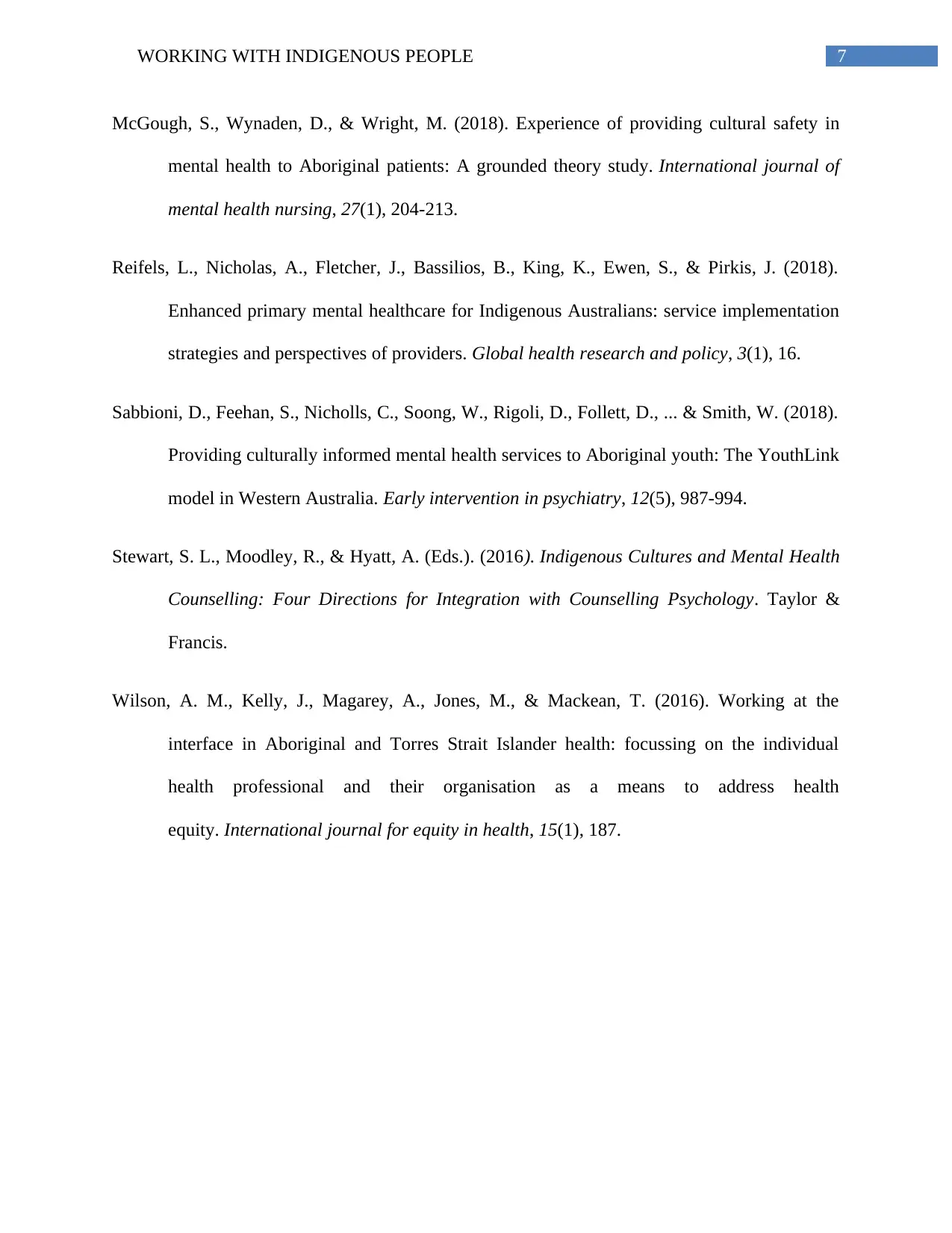
7WORKING WITH INDIGENOUS PEOPLE
McGough, S., Wynaden, D., & Wright, M. (2018). Experience of providing cultural safety in
mental health to Aboriginal patients: A grounded theory study. International journal of
mental health nursing, 27(1), 204-213.
Reifels, L., Nicholas, A., Fletcher, J., Bassilios, B., King, K., Ewen, S., & Pirkis, J. (2018).
Enhanced primary mental healthcare for Indigenous Australians: service implementation
strategies and perspectives of providers. Global health research and policy, 3(1), 16.
Sabbioni, D., Feehan, S., Nicholls, C., Soong, W., Rigoli, D., Follett, D., ... & Smith, W. (2018).
Providing culturally informed mental health services to Aboriginal youth: The YouthLink
model in Western Australia. Early intervention in psychiatry, 12(5), 987-994.
Stewart, S. L., Moodley, R., & Hyatt, A. (Eds.). (2016). Indigenous Cultures and Mental Health
Counselling: Four Directions for Integration with Counselling Psychology. Taylor &
Francis.
Wilson, A. M., Kelly, J., Magarey, A., Jones, M., & Mackean, T. (2016). Working at the
interface in Aboriginal and Torres Strait Islander health: focussing on the individual
health professional and their organisation as a means to address health
equity. International journal for equity in health, 15(1), 187.
McGough, S., Wynaden, D., & Wright, M. (2018). Experience of providing cultural safety in
mental health to Aboriginal patients: A grounded theory study. International journal of
mental health nursing, 27(1), 204-213.
Reifels, L., Nicholas, A., Fletcher, J., Bassilios, B., King, K., Ewen, S., & Pirkis, J. (2018).
Enhanced primary mental healthcare for Indigenous Australians: service implementation
strategies and perspectives of providers. Global health research and policy, 3(1), 16.
Sabbioni, D., Feehan, S., Nicholls, C., Soong, W., Rigoli, D., Follett, D., ... & Smith, W. (2018).
Providing culturally informed mental health services to Aboriginal youth: The YouthLink
model in Western Australia. Early intervention in psychiatry, 12(5), 987-994.
Stewart, S. L., Moodley, R., & Hyatt, A. (Eds.). (2016). Indigenous Cultures and Mental Health
Counselling: Four Directions for Integration with Counselling Psychology. Taylor &
Francis.
Wilson, A. M., Kelly, J., Magarey, A., Jones, M., & Mackean, T. (2016). Working at the
interface in Aboriginal and Torres Strait Islander health: focussing on the individual
health professional and their organisation as a means to address health
equity. International journal for equity in health, 15(1), 187.
1 out of 8
Related Documents
Your All-in-One AI-Powered Toolkit for Academic Success.
+13062052269
info@desklib.com
Available 24*7 on WhatsApp / Email
![[object Object]](/_next/static/media/star-bottom.7253800d.svg)
Unlock your academic potential
Copyright © 2020–2026 A2Z Services. All Rights Reserved. Developed and managed by ZUCOL.





